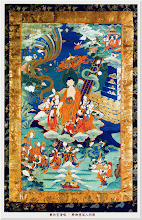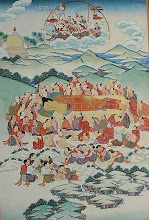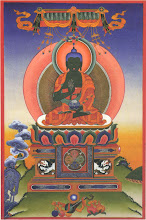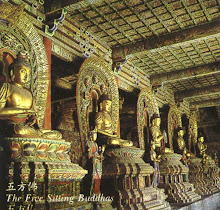Lectures by the Venerable Master Hsuan Hua,
Given at Gold Mountain Monastery,
San Francisco, California, in 1974
The Sutra in Forty-two Sections Spoken by the Buddha
Section 27 to 30
-----------------------------------------------------------------------
Section 27
One Attains the Way after Letting Go of Attachments
The Buddha said, person who follows the Way is like a floating piece of wood that courses along with the current. If it does not touch either shore; if people do not pluck it out; if ghosts and spirits do not intercept it; if it is not trapped in whirlpools; and if it does not rot, I guarantee that the piece of wood will reach the sea. If students of the Way are not deluded by emotion and desire, and if they are not caught up in the many crooked views, but are vigorous in their cultivation of the unconditioned, I guarantee that they will certainly attain the Way. "
The twenty-seventh section sets forth an analogy to explain that in cultivating the Way, one should stay clear of all kinds of obstacles. What are the two shores? The two shores refer to emotion and desire. Emotion and desire further divide into two kinds: (1) the emotion and desire of views and thought and (2) the emotion and desire of ignorance. With the first, you grow attached to birth and death, which is represented by this shore. With the second, you become attached to Nirvana, which is represented by the other shore. Wood that is plucked out by people is analogous to cultivators getting caught in the nets of crooked views. Wood that is intercepted by ghosts and spirits is analogous to cultivators who get covered by the nets of views and thoughts.
Being caught up in a whirlpool refers to being lazy, which is the opposite of being vigorous. Rotten wood represents the opposite of unconditioned dharmas. Some cultivators are not properly mindful of True Suchness in a straightforward manner, and although they often wish to be vigorous, they end up retreating. It is as if they were in a whirlpool: although the water flows fast, it merely circles in the same spot. Similarly, they return to where they started and cannot reach unconditioned dharmas. Since they cannot reach the unconditioned, they become attached to appearances and cannot perfect the cultivation of blessings and wisdom. People in this situation are likened to rotting wood. They are bound to sink, and they will not reach the other shore of Nirvana. They won be able to end birth and death. That the result of being confused by emotional desire and caught up in the myriad crooked bypaths of love and views. If one is properly mindful of True Suchness and vigorously cultivates, understands that the fundamental nature of the Dharma is originally unconditioned, and can withstand being turned by emotions and love, then one will certainly attain the Way. That is the general meaning of this section of the text.
The Buddha said, person who follows the Way is like a floating piece of wood that courses along with the current. "The Buddha compares a cultivator of the Way to a piece of wood that is carried downstream by the current. If it does not touch either shore. It doesn’t get caught in or obstructed by the rocks along either bank. If it made contact with the two shores, the wood could get stopped. Not touching the two shores, the wood does not get stopped. Likewise, the cultivator doesn’t get hindered by emotion and desire. If people do not pluck it out is not grabbed by people; if ghosts and spirits do not intercept it or is it stopped by ghosts or spirits; if it is not trapped in whirlpools doesn’t spin around and get stopped; and if it does not rotor does it become spoiled or corrupted, I guarantee that the piece of wood will reach the sea. If students of the Way are not deluded by emotion and desire, and if they are not caught up in the many crooked views, if they are not confused by love and emotion or by material desires, and if they are not obstructed either by ignorance or by laziness, but are vigorous in their cultivation of the unconditioned dharmas, I guarantee that they will certainly attain the Way. They will surely accomplish the Way.
-------------------------------------------------------------------
Section 28
Don Indulge the Wild Mind
The Buddha said, be careful not to believe your own mind; your mind is not to be believed. Be careful not to get involved with sex; involvement with sex leads to disaster. After you have attained Arhatship, you can believe your own mind."
In the twenty-eighth section, the Buddha says that the mind is like a horse that is difficult to tame and subdue. Then there is sex. Whether you are male or female, you should stay clear of sex. If you don stay away from it, disasters will arise. From countless eons in the past until the present, however, we living beings have let our passions and desires run away with us, and thus we keep turning in the six destinies of samsara. We are unable to realize Arhatship because we are continually caught up in ignorance, views of emotional love, and pride. Therefore, we shouldn’t believe our own thoughts. We cannot be careless and inattentive. We must be careful not to get involved with sex. We must not believe our own minds.
The Buddha said, be careful not to believe your own mind. " Don’t listen to the thoughts in your mind; don believe the things you’re thinking. You should be extremely careful not to believe your own mind. Your mind is not to be believed. Your mind is unreliable, and cannot be trusted.
You must be careful not to get involved with sex; involvement with sex leads to disaster. Be extremely careful not to become attached to beautiful appearances. If you get too deeply involved in beautiful appearances, disasters are bound to occur. After you have attained Arhatship, you can believe your own mind. After you have realized Arhatship and cut off afflictions of views and thought, you can believe in your mind a little more than before. But you still shouldn’t believe in it too much.
---------------------------------------
Section 29
Proper Contemplation Counteracts Sexual Desire
The Buddha said, be careful not to look at women, and do not talk with them. If you must speak with them, be properly mindful and think, am a Shramana living in a turbid world. I should be like the lotus flower, which is not stained by the mud.' Think of elderly women as your mothers, of those who are older than you as your elder sisters, of those who are younger as your younger sisters, and of very young girls as your daughters. Bring forth thoughts to rescue them, and put an end to bad thoughts. "
The twenty-ninth section explains that men should stay far away from women, and that women should stay far away from men to prevent any mistakes from happening. This is using the method of ringing forth the good and ending the bad" to combat love and desire. So one is said to be like a lotus flower. This analogy can apply to men as well as to women. The lotus flower grows from the mud, but is not defiled or soiled by it. Think this way and your mind will be proper. This is the way to help yourself out. Men should regard elderly women as their own mothers, and women should regard elderly men as their own fathers. Men should see women who are the same age as they are, or slightly older, as their own elder sisters; and they should see women who are younger than they are as their younger sisters. They should view all children as they would their own and resolve to take them all across. By resolving to cross them over, you are being compassionate, and you are benefiting others. Since you can benefit yourself and also benefit others, the mutually beneficial behavior will bring a response, and your evil thoughts will naturally disappear. You will also have fewer discursive thoughts.
The Buddha said, be careful not to look at women, and do not talk with them. " The Buddha is teaching men how to act towards women. For women in relation to men, he would say, e careful not to look at men, and do not talk with them. " You can get together with members of the opposite sex and chat. Not to mention joking around with them, you shouldn’t even speak with them. If you must speak with them, be properly mindful and think, am a Shramana living in a turbid world. I should be like the lotus flower, which is not stained by the mud. " Now, if there is a situation where it is necessary to speak with a member of the opposite sex, what do you do? You shouldn’t have improper thoughts; you should be proper and mindful. A man should think, am a Shramana, a Bhikshu " and a woman should think, am a Bhikshuni " Regardless of whether we are men or women, we are all living in the Evil World of the Five Turbidities. Although this turbid, evil world is an unclean place, we should be like lotus flowers. Men can be compared to lotus flowers, and so can women. The lotus grows in the mud and yet is not defiled by the mud. It is born from the mud, but the mud does not stain it.
Think of elderly women as your mothers. Women who are older than I am are my mothers; men who are older than I am are my fathers. Think of older people in this way. Think of those who are older than you as your elder sisters. omen who are slightly older than I am are like my elder sisters; men who are slightly older than I am are like my elder brothers. " Think of those who are younger as your younger sisters. Those who are younger than I am are like my little sisters. " That how men should see women. And how should women see men? They should think, those who are younger than I am are just like my little brothers. "
And think of very young girls as your daughters. You should consider children who are ten years old or younger as your own sons and daughters. Bring forth thoughts to rescue them. So no matter whether it is your father or your mother, your older brother or sister, or your younger brother or sister, you should resolve to rescue them all, so they can leave suffering and attain bliss. And you should put an end to bad thoughts. Then you will be able to stop having evil and deviant thoughts, particularly thoughts of sexual desire.
--------------------------------------------------------------------
Section 30
Stay Far Away from the Fire of Desire
The Buddha said, people who cultivate the Way are like dry grass: it is essential to keep it away from an oncoming fire. People who cultivate the Way look upon desire as something they must stay far away from. "
The thirtieth section tells people to keep at a distance from all thoughts of desire. Don’t be burned by the fire of desire. What meant by dry grass? The six emotions and their corresponding six sense organs are like dry grass. The six defiling objects are like a raging fire. Before you have reached the state where both the mind and external states are forgotten, you should cultivate the supreme conduct of keeping your distance. What meant by the forgetting of the mind and external states? Inwardly one contemplates the mind, and there is no mind. There isn’t any mind at all; it truly empty. Outwardly one contemplates forms, and there are no forms; nor are there any external states. The mind is empty, the body is empty, and both the mind and external states are forgotten. The eyes see everything, but there is nothing. At that point, you are no longer turned by the six sense organs and the six defiling objects.
The Buddha said, people who cultivate the Way are like dry grass: it is essential to keep it away from an oncoming fire. "You could say people who cultivate the Way " refers to Bhikshus, Bhikshunis, Upasakas, and Upa sikas; all who cultivate the Way are included. They are like dry grass. What happens between men and women can be compared to dry firewood or dry grass that is brought close to a raging fire. Since it is dry, all you have to do is touch it with just a tiny bit of fire, and the whole thing will ignite and burn itself up.
So when there is fire, people who cultivate the Way should stay away from it. You should avoid it. What is meant by fire here? It means desire and love, emotional desire and the experiences of the six defiling objects. The six sense organs belong to emotion, and the six defiling objects are external states that confuse people. The six sense organs (eyes, ears, nose, tongue, body, and mind) and the six defiling objects (sights, sounds, smells, tastes, tangibles, and dharmas) have confused people to the point that they are born as if drunk and die as if in a dream.
People who cultivate the Way look upon desire as something they must stay far away from. People who cultivate the Way should stay away from desire. You should keep your distance from it. You should see as if not seeing, hear as if not hearing.
The eyes contemplate shapes and forms,
but inside there is nothing.
The ears hear the world sounds,
but the mind is not aware of them.
When you reach that point, there is no need to practice keeping your distance. If you can be around sense objects all the time without any problem, then it is all right. But if you can handle that, then you should practice keeping your distance.
End of Section 27 to 30
---------------------------------
Subscribe to:
Post Comments (Atom)


























.jpg)















No comments:
Post a Comment